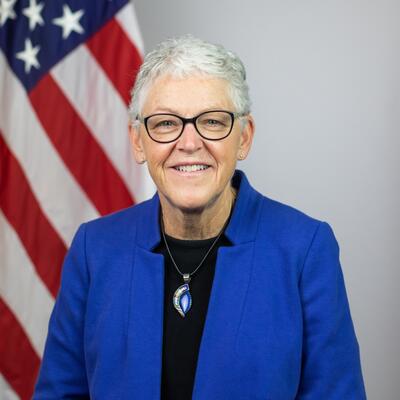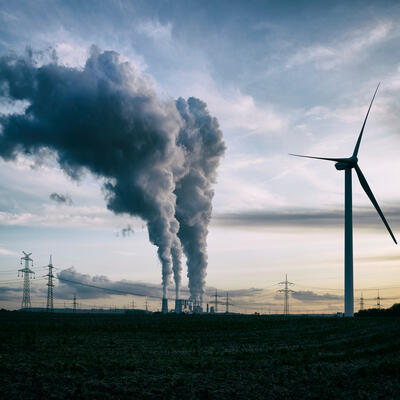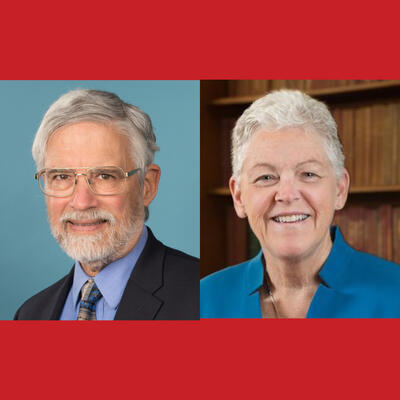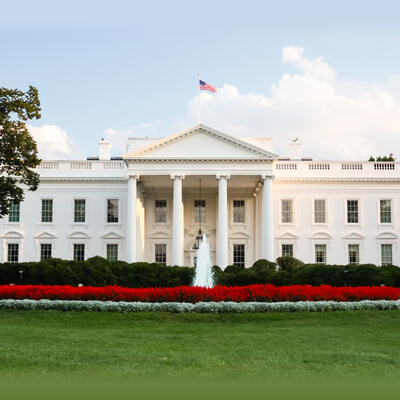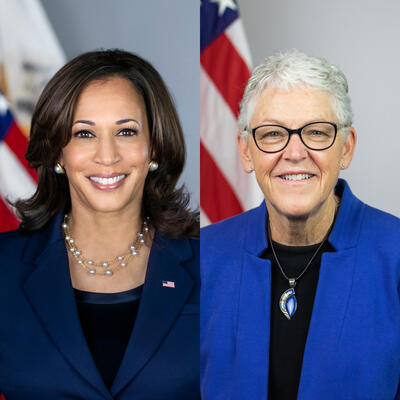
Kamala Harris and Gina McCarthy: Views From The Inside
Guests
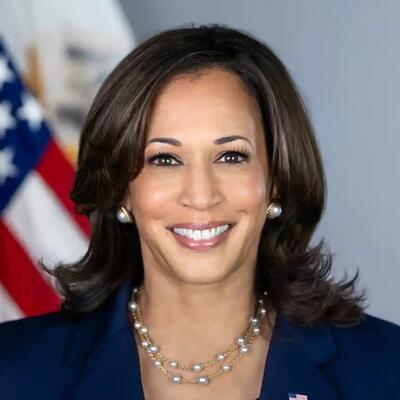
Kamala Harris
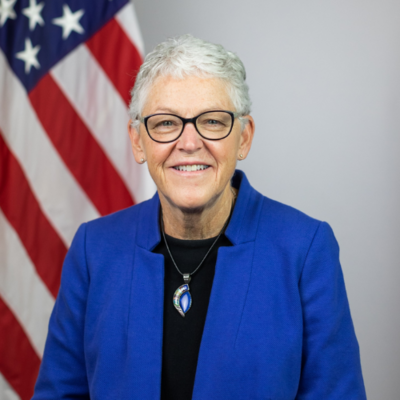
Gina McCarthy

Leah Stokes
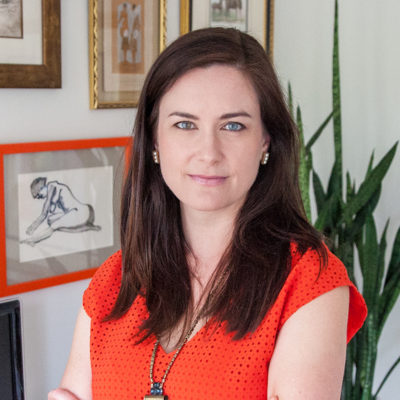
Katharine Wilkinson
Summary
It’s been a big year for U.S. climate policy. Three major pieces of legislation: the Bipartisan Infrastructure Act, the CHIPS and Science Act and the Inflation Reduction Act have all become law, ushering in the largest commitment of federal money toward the climate crisis to date. In a bipartisan vote, the Senate also finally ratified the Kigali Amendment to the Montreal Protocol, which will help phase out the use of some of the most potent greenhouse gasses.
Gina McCarthy helped shepherd those big pieces of legislation. She has had a long and storied career in public service, serving as Environmental Advisor to Mitt Romney when he was Governor of Massachusetts, leading the US EPA during the Obama Administration and recently stepping down from her role as President Biden’s White House National Climate Advisor.
“Biden's message was just so attractive to me. It was so in line with how I think about communicating on climate as being an opportunity to have a different type of economy that's better for everyone, in so many different ways,” she says.
For the Obama administration, the centerpiece of climate policy success was the Paris Climate Accords. Gina McCarthy was an integral part of those negotiations, which continued right up until the very last moment:
“It was uncertain we would ever get an agreement of this stature, this breath of agreement until right before we were ready to board the plane,” she says, adding that she’ll never forget the feeling of energy among her colleagues on the trip home.“It felt like I was flying about a thousand feet above the plane. It was just so exciting.”
Climate policy has been on somewhat of a rollercoaster ride during the past three administrations. President Trump pulled out of the Paris Climate Accords, and then President Biden promptly rejoined on his first day in office.
As part of its larger approach to climate policy, the Biden Administration has also aimed to incentivise companies to bring manufacturing back to the US. In a special interview between Vice President Kamala Harris and the hosts of the podcast A Matter of Degrees, Katharine Wilkinson and Leah Stokes, Vice President Harris explains, “We're not where we need to be, but we have evolved around the importance of clean industries, as compared to a lot of other nations. And so we see a benefit to investing here in production, understanding and believing that our standards are closer to where we should be as a globe in terms of manufacturing.”
Having these climate accomplishments will bolster the U.S. negotiating position during the UN climate summit in Sharm El Sheikh, Egypt. Loss and damage, or the idea that countries who are large emitters should financially compensate countries who have low emissions but are bearing the worst effects of the climate crisis, is expected to be a central topic this year.
Gina McCarthy says despite recent domestic policy successes, the US needs to show commitment to countries who need financial help because of the climate crisis.
“I think we have to be hopeful about what we've been able to do, but also continue to push really hard for the world to get together and to figure out how to deal with the challenge that is already before us and will only get worse if we don't act.”
Related Links:
The All We Can Save Project
A Matter of Degrees Vice President Kamala Harris Interview
Full Transcript
Note: Transcripts are generated using a combination of automated software and human transcribers, and may contain errors. Please check the actual audio before quoting it.
Greg Dalton: This is Climate One. I’m Greg Dalton. Three recent national laws on infrastructure, microchips and energy are ushering in the largest commitment of federal money ever toward addressing the climate crisis. The Senate - in a bipartisan vote - also finally ratified the Kigali Amendment to the Montreal Protocol, which will help phase out the use of some of the most potent greenhouse gasses. These accomplishments have been decades in the making. It’s been quite an emotional roller coaster and political drama. Later in the program we’ll hear an inside view of the past decade from Gina McCarthy, President Biden’s former White House National Climate Advisor and President Obama’s Administrator of the U.S. EPA.
First, we’re featuring a special interview with Vice President Kamala Harris on the administration’s climate priorities. She sat down recently with our friends at the podcast A Matter of Degrees with a live audience in San Francisco. Leah Stokes is a heat pump evangelist and Associate Professor of Environmental Politics at UC Santa Barbara. Katharine Wilkinson is an author, teacher and founding executive director of The All We Can Save Project. Here’s Dr. Wilkinson.
Dr. Wilkinson: Madam Vice President, what led you to recognize the urgency of the climate crisis and the need to fight for climate justice? And how did you end up in this work?
The Vice President: I’m a Bay Area kid. I grew up here. And from elementary school on, it was a big part of the discussion about the challenges our country is facing and what we need to do about it. My parents met when they were graduate students at UC Berkeley in the ‘60s. [Applause.] And they were active in the Civil Rights Movement. And -- and so I grew up at this -- in this very interesting time in this incredible place -- where there was activism that was around -- you know, we called it “ecology” then, right? We had different names for it. But there was the activism that was that and the Civil Rights Movement.
The Vice President: And so everything in the environment growing up was about a fight for justice and a fight for the freedom to live and be. And when I think about the environmental movement, the environmental justice movement, it, at its core, really is about that and much more. And then, of course, you know, I remember being very young during one of the most significant droughts that California ever experienced, in the ‘70s, and what we learned as kids about what you need to do in terms of conserving water and recycling water and -- and the precious nature of it all. And so it just was very much a part of everything I knew, that I learned from the earliest stages about everything that was important. This was one of those big things.
Dr. Wilkinson: I think that role of our context and our community in shaping our paths is so powerful. And I love that you brought us right into the heart of the matter, which is about a life-giving present and hopefully a life-giving future.
Dr. Stokes: Yeah. And I love how you also center people. You know, too often we think the environment, climate, that it's not about people, but this is actually about all of us -- right? -- making sure that we have a livable future, making sure that children don't have exposure to pollution, especially children of color. You know, that's really what this is about. It's about people. So I wanted to talk next about a really exciting thing. You might have heard of it. Congress just passed a law called the Inflation Reduction Act. [Applause.]
The Vice President: [Laughs.]
Dr. Stokes: Yeah. I do believe there were some people who even voted for it in the audience here, including Madam Vice President herself. That was a very important vote you took, yes. Because this is the largest piece of climate legislation in American history and one of my favorite parts of the climate bill is that there are now rebates and tax credits to help Americans get a heat pump. “What is a heat pump?” you ask.
Audience: Wooo!
Dr. Stokes: Oh, all my friends in the audience know already. Well, let me just remind you. A heat pump is an efficient electric machine that can both heat and cool your home with no gas necessary, no fossil fuels required. [Applause.] It’s very exciting. Yes. So I could go on and on about heat pumps for a while. But this isn't about me, this is about you. So I would love --
The Vice President: So what do I think about heat pumps? [Laughter.]
Dr. Stokes: Well, obviously, you must love them. But I would love to hear: What are some parts of the Inflation Reduction Act -- this -- this amazing new law that you are most excited about?
The Vice President: I mean, so much. So much. I'm -- one of the things that I'm very excited about is what we have been doing in terms of electric vehicles. And I have a particular fondness, I must tell you, for electric school buses. I love electric school buses. [Applause.] I really do. And we're manufacturing them in our country. I've been to the manufacturing plants. I've been on these electric school buses. And think about it: Aside from the pandemic, on a daily basis, 25 million children in our country every day go to school on those diesel-fueled school buses. And hundreds, thousands of school bus drivers are driving those buses, which are -- then these people -- these children, these adults -- are inhaling what is toxic air. And so, I think about it in terms of the manufacturing piece of it. I think about it -- and U.S. manufacturing. And I -- and I say that with a sense of pride. I think about it in terms of the jobs that we are creating that are those jobs to manufacture it. I think about it from the context of public health. And I think about it in the context of education. Because there is so much about this movement that really is the intersection between the economy, between what we must do that is about public health, what we must do that recognizes that those dangers to public health invariably affect our most vulnerable of our population and, in particular, children who, when exposed to these toxins, when exposed to pollution, it can impact their ability to learn. And so that's one of the things I'm very excited about. I'm very excited about the tax credits. And so -- think about it: We're now giving tax credits, because of the Inflation Reduction Act, at point of sale. That's really im- -- for electric vehicles. That's very important. Because the reality is, for most people, to try and fill out a tax form and figure out which credits you can apply for, it’s complicated. And so we're now making it more simple. But also, at point of sale getting the credit. So basically, it's off the sticker price, because a lot of folks can't wait until they get the -- the refund later in the year. And then the other piece of the credit is that, for the first time, not only is it at point of sale, but it applies to used vehicles as well as new vehicles. And that's very important because the majority of car sales in America are for used vehicles. I think something like 75 percent. So when we're thinking about how the intersection between environmental policy and tax policy -- right? -- tax policy when it's doing the right thing hopefully will encourage good behaviors and smart behaviors -- this is that intersection.
Dr. Stokes: Yes, it's so true. we really are only at the beginning of what the Inflation Reduction Act is going to do. And it's really a testament to your leadership that that bill was able to get across the finish line.
The Vice President: And there's another piece of it that I'm equally -- I mean, they're, you know, in equal parts excitement.
Dr. Stokes: There’s a lot to talk about.
The Vice President: Yes. Yes. But the env- -- the environmental justice piece. And as many of you from the Bay Area and San Francisco may remember, when I was DA of San Francisco, I created one of the first environmental justice units of any DA’s office in the country. And that was back in 2005. And here’s how that came about: As we know, there is a community in San Francisco, Bayview–Hunters Point -- And at the time, the annual household income in Bayview–Hunters Point was about $15,000 -- one-five. And what we were finding is that polluters were dumping in Bayview–Hunters Point. And this is the kind of phenomena that you see around the country where in low-income communities and communities of color, you see a disproportionate -- you know, bad actors, treating these communities like dumping grounds. And so I went after them as a prosecutor, and then we created an environmental justice unit to talk about the importance of all that the Inflation Reduction Act will do, in terms of reduction of emissions and mitigation and adaptation. But also, in this movement, there has to be some recognition for the important -- importance also of enforcement and making sure that we create incentives that include disincentives for bad behaviors and consequences when those bad behaviors occur. And so that's what I did back then. And then for our bill now, the work of EJ being investing in communities. Investing in communities in a way we don't tell the community what we've done for them. We ask the community what do they need and let them inform us -- [applause] -- of what is in their best interest, right? And so doing that in a way that we also support community-based organizations that, for example, will help the residents of that community with rebates, which will occur under our policies; will help the community with mitigation and adaptation and resilience around job creation, hiring locally, training locally in those communities for these very important jobs that are jobs that require important skills that are there as part of the capacity of the community but need to be invested in. So these are some of the components of the environmental reduction -- I mean, the Inflation Reduction Act that I think are very, very important in terms of investing in all communities. Because we also know that disproportionately low-income communities and communities of color throughout our country are most at risk for the greatest crises and challenges that we face.
Dr. Wilkinson: And I love that these are jobs that we will need in every community -- from coast to coast, north to south -- every part of this country. We've been talking about kind of the latest big climate news from the nation's capital. But we have seen the Biden-Harris administration really take climate up with gusto from day one. So, setting up the National Climate Office in the White House, of course, making sure that every single federal agency is focused on how they can contribute to climate solutions. There have been other bills before the Inflation Reduction Act that have made really significant climate investments. We've seen the largest investment in public transit ever. We have seen the largest investment in EV charging infrastructure ever. So what are some of the climate actions that the administration has taken that folks may not know so much about?
The Vice President: A lot of it has to do with a real intentionality that we have to re-shift industries and do that in a way that we are emphasizing the importance of U.S. investment and U.S.-based R&D -- research and development. The President and I both care deeply about the importance of investing in -- in scientists, in engineers, and that research. [Laughs.] And so the President and I really are both, for very personal reasons, very passionate about that. And so there is this very -- a strong and purposeful focus on what we are doing with the -- with the act to invest in research and development. There is a lot of what we're doing in terms of thinking about how we shift in terms of how we are growing industry and capacity to do U.S.-based manufacturing for a variety of reasons, and I'll mention two in particular. One which caught our attention during the pandemic, which is supply chain. But the second has to do with the fact that we have, as a nation, over the years really -- we're not where we need to be, but we have evolved around the importance of clean industries, as compared to a lot of other nations. And so we see a benefit to investing here in production, understanding and believing that our standards are closer to where we should be as a globe in terms of manufacturing. On day one, President Biden put the United States back in the Paris Agreement. Very exciting. And after that, you've been going around the world talking to world leaders in your role as the Vice President, and we'd love to hear what that experience has been like. What are you hearing from other world leaders about climate change and about the United States’ leadership under the current Biden-Harris administration?
Okay. So, as Vice President, at this point I've met with -- in person or by phone -- my team tells me, 100 world leaders -- so presidents, prime ministers, chancellors, kings -- and on a variety of subjects. But one of the subjects I raised in almost every discussion is this one. And the countries that I've talked with range from countries on the continent of Africa, to one of the newest world leaders, Albanese of Australia, to also recently I convened the Caribbean leaders. And I'm happy to report, for example, Australia, and -- and the new head of state there, is really committed, in a very personal way, to this issue -- which is a really great transition from the previous administration there -- and will be very significant because, of course, it is an Indo-Pacific nation, and we are an Indo-Pacific nation. And when we think about this region of the world and the collaboration between us, it is very important to have that kind of partner. But the conversations range. The Caribbean nations, for example, they are acutely aware of the fact that they are some of the lowest emitters paying the highest price of emissions. And the question then becomes: What do we, who are some of the greatest emitters of greenhouse gas emissions -- what is our role and responsibility? I mean, you know, that was old saying: One person sneezes and the other one catches the cold. Right? And so meeting with the Caribbean leaders, they are extremely concerned because this is an issue that is not only about degrading manned [sic] -- land mass for them -- their island nations -- but also, extreme climate, extreme weather occurrences impact tourism. And tourism is the greatest contributor to their GDP. So you see now the cycle, because if we are saying all nations must step up around reduction of emissions and mitigation, because that is -- part of the international rule and norm, if you will, in this movement is not only about emissions, but what each nation must take on as a responsibility for resilience and adaptation. They’re saying -- look, I mean, our tourism and our GDP, therefore, have dropped pretty significantly. And we're not one of the greatest emitters, and here we are paying some of the greatest price proportionate to our population and our GDP. So the conversation ranges from what we -- who our high-income nations can do and what we should do, what is our responsibility globally as well as domestically, and also how are we, as a world community, going to ensure that we are sharing resources in a way that the collective benefits. Because, you know, be clear also: This is an issue, which is something where we should feel a great sense of collective responsibility.
Dr. Stokes: Thank you all for coming today. Please join me in thanking the Vice President.
Greg Dalton: That was Leah Stokes and Katharine Wilkinson, hosts of the podcast A Matter of Degrees in conversation with Vice President Kamala Harris.
Greg Dalton: This is Climate One. I’m Greg Dalton. Gina McCarthy has had a long and storied career in public service. She served as Environmental Advisor to Mitt Romney when he was Governor of Massachusetts, lead the US EPA during the Obama Administration and recently stepped down from her role as President Biden’s White House National Climate Advisor. Upon leaving office she said, “I’m totally exhausted and leaving on a high note.” I asked her what it was like to take a step back from her latest national policy post.
Gina McCarthy: Well, you know, Greg, to be honest, I had never really committed to a whole lot longer than a year because there were things going on in my family. I have four young grandchildren and love to spend time with them. But, you know, I always knew that the White House was kind of a very rapid paced little place. And it turned out to be exactly as I knew it was. And so, it's you know those jobs are demanding, you know, I looked around and there were very few people even close to my age, you know, and that's a good thing. But it gave me a wonderful opportunity really to make some impact that just wasn't available to me during the Obama administration. So, I couldn't resist going. I thought that you know as a candidate, Biden's message was just so attractive to me. It was so in line with how I think about communicating on climate as being an opportunity to have a different type of economy that's better for everyone so many different ways. really, really wanted to get a few big things done and I wanted to see really how this whole of government approach to climate would work And so, I was really happy and obviously the capstone of that was to get the Inflation Reduction Act over the finish line which I just think is a game changer.
Greg Dalton: And we’ll talk about the Inflation Reduction Act clearly, the big climate achievement of the Biden administration so far. What are you most proud of other than that and where there some things that you wish you could accomplish things that, maybe got away?
Gina McCarthy: You know I had an amazing team of young people working with me and frankly I worked for them. Because all along climate has not been about my generation as much as the next. And so, it was just a fantastic experience and I think what I was testing most was this idea or of whole of government because when I was EPA administrator under the Obama administration when we talked about climate it was all about how EPA could regulate. You know that ended up being the strongest issue in the Department of The Interior to some extent. But it was very different with the approach that Biden took. He said that climate is about everything. So, every agency had to be coordinating their key decisions with us to ensure that climate was a consideration. We actually had meetings where cabinet the cabinet level and the administration level were all sitting around the tables mostly virtual but sitting around the table really talking about how they could be players on climate. So, we were able to, you know, make big steps under the treasury looking at some of the ways in which the business community could be challenged to be more explicit and more unveiling of their climate risks and their climate investments. These are big things that happen. We had a terrific opportunity to work with transportation in a way that we never worked with before. Not just on regulation but they independently did terrific work on climate. And we had the Bipartisan Infrastructure Law that actually was about how you spend money and that was crafted at every step of the way with climate in mind. Both climate and environmental justice, which to me, it was sort of the vision and the work that I would love to have had through the Obama administration, but only now was that available. Only now did we have the technologies to make different choices than we had before.
Greg Dalton: Right. It’s definitely moved from that kind of EPA traditional enviro agency and lane to much broader as climate has come into our daily lives. And there has been climate policy has seen highs and lows over the past three administrations. We’d like to revisit some of those moments and get your insights as someone who was in the game, so to speak. Let’s start in 2016 when the United States and China both agreed officially to enter the Paris accord. Then President Obama gave these remarks. Let’s listen.
[Start Playback]
Obama: The world has officially crossed the threshold for the Paris Agreement to take effect today. The world meets the moment, and if we follow through on the commitments that this Paris Agreement embodies, history may well judge it as a turning point for our planet.
[End Playback]
Greg Dalton: So, how did you, if you can go back to that moment where there had been lots of disappointments leading up to Paris. How did you feel when he made that speech that moment?
Gina McCarthy: Well, you know, one of the more memorable experiences for me was going to Paris and participating in those discussions. And it was actually the flight home because it was uncertain we would ever get an agreement of this stature, this breath of agreement until right before we were ready to board the plane. You know, it was so tight in timing. And I'll never forget that plane flight because it was filled with all of our US colleagues and it was a commercial flight but we were all there just bundled together and it felt like I was flying about a thousand feet above the plane. It was just so exciting. And so, at that moment it really felt like it was the turning point. So, President Obama was right but you know, like anything else in government and I’d been doing this so long is that you have so many highs and lows, especially on things that matter, right. So, you make progress you take steps back you make progress you take steps back. it was a wonderful moment and I think it filled all of us with real energy and enthusiasm even though you know we knew that the road ahead was not going to continue to go as fast as we would ever hope. It just doesn't happen like that, Greg. The trick is for something like climate is you know we know what's at stake here. So, you may be run forward and be joyful but if you go backwards all you doing is guaranteeing that folks like me just double the effort the next time.
Greg Dalton: The years since Paris had been an emotional roller coaster for me. I can only imagine how it's been for you, starting with former president Trump removing the United States from the Paris climate accords. Let's listen to that announcement.
[Start Playback]
Trump: The United States will withdraw from the Paris Climate Accord. The Paris Climate Accord is simply the latest example of Washington entering into an agreement that disadvantages the United States to the exclusive benefit of other countries
[End Playback]
Greg Dalton: How did you react hearing that then and how is it hearing that now?
Gina McCarthy: Well, of course we all knew it was not a surprise. And so, even though it wasn't a surprise it was a little bit of disbelief that that this kind of whiplash could occur in the United States in terms of how our government works. So, that was I think very challenging for all of us it happened quickly, so, that was difficult. I have to say that there were many other decisions that President Trump made that made me even more upset because --
Greg Dalton: Such as?
Gina McCarthy: Oh man, I cannot, it's hard to even go through all of them. And I don't frankly think it's worth it, Greg, but --
Greg Dalton: Well, one concern was the agency that the agency would be demoralized and people would leave. So, how much damage was done to the premier agency?
Gina McCarthy: Well, I think you know one of the things that he decided to do is really to fill all of the you know, small paid political offices with some of the individuals that clearly were only there to take down the government structure that was necessary to protect people's health and the environment and to address climate change. So, I think I had a little bit of culture shock originally when I saw what was going on with the agencies. My heart was broken for the employees in that agency who really many of them had dedicated 40+ years of their life to that agency. And it was upsetting to me that the young people there, you know, many of them just had to leave. And to see that kind of deterioration in the system and to know that, you know, 15,000 wonderful human beings were put through that kind of culture shock was to me really upsetting because I love each and every one of them. It was a great agency and it struggled mightily during that period of time in trying to get back again.
Greg Dalton: The first things that President Biden did after getting into office was re-joined the Paris accord. It was a time of ambition and exuberance. I remember feeling buoyant like, you know, excited about the people who were being appointed the whole of government approach and the climate was being infused throughout the administration. Most of the policy was wrapped up in his Build Back Better agenda. There was some debate about whether that was too ambitious too big. you think of Build Back Better, was it too big was it appropriate ambition?
Gina McCarthy: Yes, it was appropriate ambition and no it wasn't too big. And Greg, I just also want to remind everybody that the Bipartisan Infrastructure Law was significant as well, which passed prior to the Inflation Reduction Act or the Build Back Better agenda. And, you know, I think part of the challenge that I know at least I was keeping in mind was yes it was a lot of money but it was a wholly different framing in terms of how this our federal government was approaching climate. And it was built on an incredible collaboration that President Biden nurtured to be able to allow this to be a really meaningful and appropriate step forward. Let me tell you what I mean by that. That we were coming off of two years plus of the pandemic. People couldn't have been in a more less hopeful more difficult place. Now, I may be speaking hope personally but I think we can all agree that it was a struggle it was demoralizing. And you cannot then vote in a president and have that president sit back and do small itsy-bitsy things to try to make the kind of hopeful and forward leaning statement that you'd expect the president of the United States to make. He went in there ready for beer. He knew he had to show the American people that we were still going to invest in ourselves. And there was a path forward, even on something as complex and complicating as climate. And he built through his campaign and through the first year in office, an incredible collaboration with unions because he knew that what he needed to do is grow jobs. And jobs he grew. He knew we had to tell families that climate wasn't going to be achieved by sacrificing. It was going to because we sacrificed enough, right? It was going to be about how we grow our economy so we are a secure country again. We are not beholding to our enemies to give us some of vital energy that we need to survive. We were going to do it ourselves. He knew that the manufacturing in the United States had all been offshored somewhere else not all but a vast majority, and we need to rebuild it in the United States of America. He knew our roads and bridges were crumbling. He knew people needed a sign that we were not going to continue down the morass of a pandemic. We will be going to stand up and we were going to make meaningful change. We were going to invest in ourselves. We’re gonna save families money. We’re going to grow jobs. This was his mantra. And this is what he delivered with these bills, not without considering the economic consequences but knowing that if he funded it the way he wanted to which is and the Inflation Reduction Act to charge the wealthy and let the good old middle-class grow and people move out of poverty. If you did that then we’re back in action again. If you did that, we are more secure. And if we did it remember, if we did it, we would have businesses the private sector rebound here in the United States because that was one of the key features of this. If we’re going to grow, we need to remember that we're a capitalistic economy we’re going to hold out every carrot that's available to us to grow our economy again and grow it onshore with products made in the United States. So, to me that entire framing was really what led to both the Bipartisan Infrastructure Law and the Inflation Reduction Act and what people will in time see is that that is the reason why the United States is in a much better position than other countries are at this point. And we can stand up and be proud of the actions we took because instead of asking people to turn off your lightbulbs and put your sweaters on climate was about doing things for our families, our workers and our future.
Greg Dalton: This is Climate One. I’m Greg Dalton. Let’s get back to my conversation with former White House Climate Advisor Gina McCarthy, who shared her own journey to better understanding climate justice.
Gina McCarthy: Well, Greg, you know, I have worked at every level of government and it became apparent to me the inequities when I was a kid. You could see the communities that were invested in and you could see those that were left behind. You know I'm 68 years old. I live through you know the civil rights era when it was really just building up. These are no surprises to me. And it became very, very clear when I was administrator at EPA in a variety of ways. it gave me a much bigger national view. I mean, what does a kid growing up in New England know about Alabama and Louisiana. What do we know about Mississippi? And so, there was a big learning curve for me to understand just how dramatic the disinvestment was. When I learned that not everybody in the United States are even close to everybody. Not everybody had access to clean water. Clean water in the richest country in the nation. When I started traveling to Indian country. When I started traveling down South. It was an eye-opening experience for me. Because you could see it and feel it. And when Flint, Michigan happened and that water crisis happened it was by far the most difficult and torturous experience that I have ever had in government. Because you saw the failure you know you saw the fact that they were a strong city of something like 200,000. When Flint Michigan's water went bad, they were had been down to 90,000 they had almost no industry left anymore. All the auto industry parts had gone away. They had shifted to a dirty system just to save money. It was in the newspaper and in the newspaper. And we didn't act as fast as we could, because we're waiting on the structure of the federal laws and who does what to home And so, it was staggering. But it was the biggest you know, slap and upside my head to realize just how extreme the issue of environmental justice was in the United States, even as recently as 2015 and 2016. it was a wake-up call for me because we had done a lot of work with the environmental justice community. Always had environmental justice consideration, we required all of our regulations to consider it. And yet still we had these examples of how entrenched these systems are. How entrenched the bias in the racism can be that can lead to these consequences.
Greg Dalton: Build Back Better of course, was put to bed when West Virginia Senator Joe Manchin announced during a Fox News interview that he couldn't support the legislation. I know many in the climate community felt somewhat hopeless when they heard the news. I vividly remember where I was and my head, I felt it in my body. How did you take that? Take us back to that moment when we thought like oh boy, this is done it’s done.
Gina McCarthy: To be really honest with you I didn't think that was the case. I know that it sorts of went made everybody go, you know, but I had seen the wavering that Senator Manchin was doing back and forth and back and forth. And I knew that in the administration nobody was going to give up. We didn't care what any one individual said we will gonna keep pushing. And so, I think the dynamic was that we couldn't know for sure whether that was the end, or I couldn't know for sure but we weren’t gonna stop we weren’t going to stop pushing and trying to figure out what we were going to get over the finish line. We wanted it to be big enough to matter. And so, we had to keep pushing and the team that the president pulled together did not stop. The big concern was just moving forward getting it over the finish line and starting to spend that money. And I think --
Greg Dalton: And some people are pretty upset about the amount of fossil fuels in the Inflation Reduction Act because it does advance fossils as well as clean energy. Is there more dirty in there than you’d like?
Gina McCarthy: No, actually, I thought it was really well done. It was nowhere near balanced, Greg, I mean that whole bill is by estimation gonna reduce a gigaton of greenhouse gases and get us on its own to 41 to 42%. And if you combine that with regulations that EPA's already announced and is going to move forward with you know it'll allow us to achieve a 50% reduction by 2030.
Greg Dalton: Greenhouse gas emission, right.
Gina McCarthy: Yeah. And so, no, it isn't no-win, there are very few fossil incentives directly in the bill. Now I understand that there are folks that are really concerned about some of the oil and gas drilling that is in this second part of the discussion and commitment. But really, I think we have to recognize a couple of things that this is the most historic step forward by far 3 to 4 times the level of anything we've ever accomplished before. And we know that fossil fuels have to be shifted over and clean energy has to be the future for us. But we also know that that's not going to be tomorrow. I mean look at what's happening in Ukraine. Look at the impact that that has had in our country in terms of the cost of fuels and what it's doing in the EU and other places. I mean it tells you or ought to tell us you know two things. That we have to be smart about energy security in terms of how we wean away from fossil fuels. It is not a spigot that we can turn off. If you think you want to help environmental justice communities which the Inflation Reduction Act provide $60 billion of investments there and environmental justice communities and 60 billion in the Bipartisan Infrastructure Law. If you want to join with me and others who care dearly about environmental justice, then think about how we can get there in a way that does same families’ money. In a way that does allow us to invest in our future and be more energy secure. These small issues I get it they are symbolic, but many of them we have to just put into a larger context and framing that we are shooting for really a 2015 net zero. I would rather get there in 2035, but I will understand that I can't get there by 2030. Which just the way it is.
Greg Dalton: And the prospects are starting to look better. David Wallace-Wells has an article on the New York Times. He was Mr. Darkness and Gloom, saying some of the darkest scenarios are he’s saying things are looking a lot better which is definitely good to hear especially from him. The IRA passed on a party-line vote in the Senate with the tie being broken by Vice President Harris, who was also part of this episode. So, getting that kind of legislation passed has been the focus for decades. Now the job is to move huge amounts of money quickly and responsibly. That’s a new game. So, what needs to happen to make IRA deployment a success and what can be learned from the Obama stimulus plan and what needs to be done and lessons from that past chapter?
Gina McCarthy: Well, Greg, let me just say that folks are making a big turnaround in the private sector on this I mean when that bill passed and it was signed into law. Billions of dollars came in from the private sector to reinvest again because that's government's job is to send signals, right. That's how you hopefully can help drive the economy in a way that will get us to those climate goals. That will allow us to get off of fossil fuels and onto clean energy that's the key. And so, the business sector really has been stepping up in a very significant way. And I think it’s one of the things hopefully I'll be able to talk about when I go to Egypt for COP 27, because I want people to know that the US has found a formula here to express our commitment in a way that's significant. But also, a formula that reconciles the fact that many countries are hurting from really excess inflation, high fuel costs. And there are opportunities here to try to get folks to realize that there's a different framing that we have to take here. These investments are essential and that's where we need to head.
Greg Dalton: The US goes to the COP 27 just beginning in Sharm El Sheikh, Egypt with policy on the books that can't be undone easily by a next president. And there's the challenge of moving lots of money. There's another piece to this which Democrats talk about winning the win. That means winning the narrative after a policy win. For example, Democrats passed the Affordable Care Act, and then which a lot of people support the policy, but they lost the narrative of Obama care. People loathed the brand even though they like the policies. So, what do you see is the narrative around this climate policy and how what is the thinking being done about that narrative going forward?
Gina McCarthy: Well, you know, you've hit on a really important issue, Greg. And it's one of the reasons why I’m grateful that John Podesta joined the administration because he’s going to be looking at you know the resources going out the door that we’ve been given in the Inflation Reduction Act. It is just a really a lot of money that needs to go out and needs to be directed carefully and quickly. And so, he's going to be I think the one still in charge of that effort. So, it’s really important for two reasons. One is that you know if the messaging around the Inflation Reduction Act and the Bipartisan Infrastructure Law is that the United States is investing in itself again. It's strengthening our families. It’s growing jobs. It's ensuring energy security. Those are the big you know kind of ticket framing and it's rebuilding in the United States again. It’s manufacturing ourselves so we’re not left to the whims of discretion of countries that don't share our values. So, those are really important considerations. But that means we have to spend it in a way that people can see, feel, taste, touch. And right now, it's very difficult because of the challenges that we are seeing with Ukraine and others. The focus still continues to be and most of the world how do we keep our lights on? How do we lower the cost of energy? So, these conflicting things happening right now that make this very challenging. But I think the administration just has to keep its nose to the grind stone. It has to go and deliver on those benefits. And thankfully the private sector here is really married up. They want these investments. They're using these investments. I just read in the paper because I'm not hanging out with the administration anymore, I’m being a good doobie, I read like there’s a $100 billion investment that was just announced making chips again. One big company. I'm like whoa, that's a big check with lots of zeros. So, we will get more money than we spend with no question. So, hopefully we can get people over the next year to see the benefits and to begin to absorb them as part of benefits that they are old and they won't let go of. That is our best opportunity is to make the change that we promised happen. And then when people change and that goes through then they do not want that change to go away. If it's lowering cost for them they’re not going to want you to take it away. If they’re repaving the roads and building new bridges and building resilience and protecting against wildfires and figuring out what to do with the drought in the western part of the, if people are seeing change that benefits them, they’re gonna hang onto it. And it's going to be very difficult to take that away with some sweeping edict.
Greg Dalton: COP 27 in Sharm El Sheikh, Egypt is just beginning. You’ll be there yammering in a private capacity. And this time US is going with even better cards in its hands than Obama had when you were with him. How does that affect US negotiating power and what do you expect to come out of COP?
Gina McCarthy: I think it's still going to be challenging. We don't go there with Congress having passed significant, you know, money to support our international collaboration so that will be challenging that’s right. But we go in there knowing that every country in the world knows that climate change is happening. We’re not arguing about that anymore, Greg. I don’t It’s happening everywhere. The damage is apparent and it's destructive and it's causing deaths in the thousands if not millions over the past decade. And so, I think the world knows that we have to move forward. So, I don't know what the agreements are going to be or pushed for in the international context. But I do know that we’ll go there with our head held high, and I think we’ll go there with promises to keep driving and pushing Congress to get the kind of commitment to the international community that we have to have. And I think we’ll go there knowing that the world is challenged right now, not just the US in terms of government structures and stability and democracies and with the war in Ukraine. But I have every confidence that the developing world will stand together and try to do its best to work with the developed world to make sure that we do our job for them. and I think we have to be hopeful about what we've been able to do, but also continue to push really hard for the world to get together and to figure out how to deal with the challenge that is already before us and will only get worse if we don't act.
Greg Dalton: Gina McCarthy, thank you so much for coming on Climate One and reflecting on your years of service and where we are now in this climate moment.
Gina McCarthy: Thanks, Greg. It was good to be here with you.
Greg Dalton: On this Climate One... We’ve been talking about current U.S. climate policy with Gina McCarthy, former White House National Climate Advisor and EPA Administrator. Climate One’s empowering conversations connect all aspects of the climate emergency. To hear more, subscribe to our podcast on Apple or wherever you get your pods.While you are there also check out A Matter of Degrees with Leah Stokes and Katharine Wilkinson. It’s always a pleasure to collaborate with them.
Talking about climate can be hard-- but it’s critical to address the transitions we need to make in all parts of society. Please help us get people talking more about climate by giving us a rating or review if you are listening on Apple. You can do it right now on your device. You can also help by sending a link to this episode to a friend. By sharing you can help people have their own deeper climate conversations.
Brad Marshland is our senior producer; Our managing director is Jenny Park. Our producers and audio editors are Ariana Brocious and Austin Colón. Megan Biscieglia is our production manager. Our team also includes consulting producer Sara-Katherine Coxon. Our theme music was composed by George Young (and arranged by Matt Willcox). Gloria Duffy is CEO of The Commonwealth Club of California, the nonprofit and nonpartisan forum where our program originates. I’m Greg Dalton.

